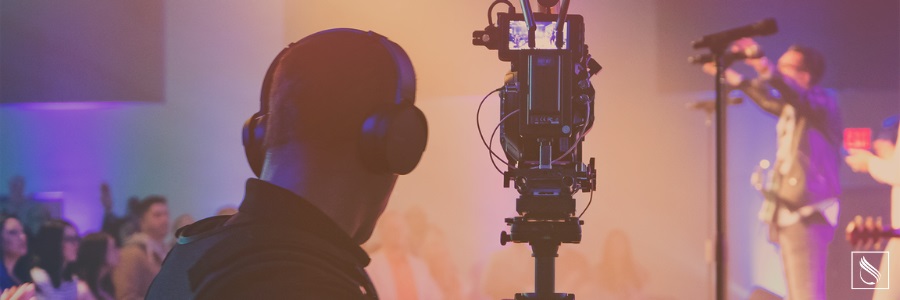In Mark 16:15, the Bible says that after He was resurrected, Jesus met with his disciples. He commissioned them to “Go into all the world and preach the Gospel to all creation.”[1] Today, Seventh-day Adventists have taken up the task of preaching the gospel to the world. With the help of exploding technology, our worldwide message is now broadcasted via television and online via the Internet.
Over the last decade or so, social media, including YouTube, Facebook, Periscope, Instagram, and Vimeo have given us the ability to reach the world differently. Additionally, churches can now have their own channels on Apple TV and Roku. Today, many of our pastors “travel” the world preaching the word to souls they would not have otherwise met.Streaming Liabilities
An online ministry expands the walls of the physical church. Be aware of the many liabilities that could be faced by your church/conference whether your church already has an online ministry, or is considering starting one.As with any church service, in person or virtual, the pastor and local church must consider several liability issues. One of the critical areas is in that of copyrights for music and possibly other content. What permissions are needed, and when are they required? What does having a particular license cover? What about the religious exemption?
For those attending church while it is being live-streamed, what must be considered regarding their privacy? Does the church need to have each attendee sign release forms? What about guests who are invited to sing or otherwise participate in the service? The list can go on and on. Let ‘s take a look at some of these issues.
Copyrights
The copyright issue can be a bit tricky, as mentioned above. U.S. Copyright law provides an exemption for churches, but that exemption is limited. In their Guide to Online Ministry, Internet streaming experts Haivision – Video at Work puts it this way. “The Religious Service Exemption in U.S. copyright law outlines permissions for churches to perform songs that are copyrighted, during their religious services. It does not, however, permit that performance to be streamed or broadcast over the Internet. So, if you stream your services, songs performed by your worship band could count as copyright infringement if you haven’t obtained a performance license.”[2]This means planning your church service takes on a new component. If you plan on streaming your church service, you need to make sure you own all the content (video, music, pictures, etc.). Or you need to have a license for any copyrighted material.
Licensing
There are a variety of licenses available, and they each serve a different purpose. According to Christian Copyright Solutions, “While considering which licenses are needed for your church, identifying these three key elements will help you analyze the coverage of rights each blanket license provides:- Type of copyrights – Does this license allow me to use sound recordings, videos, or just musiccompositions?
- Type of rights granted – Will this license provide the rights I need to perform, reproduce, or make derivatives of a copyright?
- Copyrights Covered – Are all the songs used in my church ministries included in the license catalog?[3]
Privacy
Everyone has an expectation of privacy, making it extremely important. Privacy is defined as “. . . our right to keep a domain around us, which includes all those things that are part of us, such as our body, home, property, thoughts, feelings, secrets, and identity. The right to privacy gives us the ability to choose which parts in this domain can be accessed by others, and to control the extent, manner, and timing of the use of those parts we choose to disclose.”[4] The law does not provide a general, well- defined right of privacy. Instead, privacy rights are gathered from various areas of the law, including the Bill of Rights in the U.S. Constitution. Each state also has laws pertaining to audio and video recordings of people, so be sure to check with local officials about regulations in your state.In general, whether capturing video constitutes a privacy violation depends on the subject’s reasonable expectation of privacy. In public places, no one has a reasonable expectation of privacy. On the other hand, you can reasonably expect privacy when you are inside your own home or another private place.
You can look at this from the view of the photographer or videographer. When capturing images, if you are in a public place or on your own property, a subject has a limited expectation of privacy and has little control over what is captured. A photographer should not capture images intending to embarrass, harass, or stalk, however, even if such images are captured in a public place.
All of the previous discussion assumes that the purpose of capturing the image or video is non-commercial. If it is for commercial purposes, the subject has many more rights, which are beyond the subject of this article.
Earlier, we mentioned obtaining permission from anyone at church where you are live streaming, whether they are a participant or not, and for the content belonging to another. But what about those merely present for the live service. Is everyone in attendance required to sign a release form? That might be a bit difficult and off-putting for a group of nine hundred people. Explicit permission is probably not specifically needed. However, everyone should be on notice that by remaining in the building, they grant their consent to use their likeness during the stream, as there’s always a chance they may be caught on camera. The following possibilities may be a solution:
- A live announcement could be made before the service
- A notice posted outside the room where the service is being held
- A message printed in the bulletin, event program, or on the church’s website[5]
- Also, the church should have areas where people can be seated that will not be captured on video or a still image. This should be made known to attendees.
References
1 https://www.biblegateway.com/passage/?search=mark+16%3A15&version=NASB
2 https://www.haivision.com/blog/faith-worship/guide-to-online-ministry-faith-streaming/
3 https://apps.christiancopyrightsolutions.com/docs/factsheets/FactSheet-ChurchBlanketLicenses.pdf
4 Yael Onn, et al., Privacy in the Digital Environment, Haifa Center of Law & Technology, (2005) pp. 1–12
5 https://www.adventistrisk.org/en-us/safety-resources/solutions-newsletter/2017/july/we-re-going- live-what-to-know-before-your-church
2 https://www.haivision.com/blog/faith-worship/guide-to-online-ministry-faith-streaming/
3 https://apps.christiancopyrightsolutions.com/docs/factsheets/FactSheet-ChurchBlanketLicenses.pdf
4 Yael Onn, et al., Privacy in the Digital Environment, Haifa Center of Law & Technology, (2005) pp. 1–12
5 https://www.adventistrisk.org/en-us/safety-resources/solutions-newsletter/2017/july/we-re-going- live-what-to-know-before-your-church


